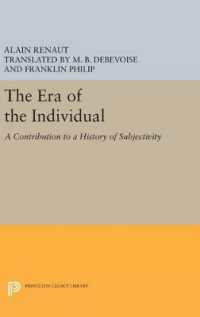- ホーム
- > 洋書
- > 英文書
- > Politics / International Relations
Full Description
The 374 documents selected for this volume many of them not previously publicly available illuminate the context, implementation, and development of Australian policies towards the South Pacific island of Nauru from 1945 to 1962.
While administering Nauru under a League of Nations' mandate (from 1920) and then under a UN trusteeship (from 1947), Australia's primary interest was accessing Nauru's phosphate and providing it to Australian and New Zealand farmers at a very favourable price. The British Phosphate Commissioners (BPC) and their staff managed this extraction on behalf of Australia and its partners, New Zealand and the United Kingdom, with the heavy work done by Chinese and other imported labourers. Phosphate extraction was interrupted in 1942, when Japanese troops took over the island. Later, as the tide of war turned, Australian ministers lobbied strenuously but unsuccessfully for US support for the early recapture of Nauru. After Japan's surrender, the three partner governments, through the BPC, ensured the prompt replacement of war-damaged infrastructure so that extraction and export could resume.
Australia's post-war External Affairs Minister, H. V. Evatt, took a leading part in establishing the UN Trusteeship system as an improved, more progressive version of the League's mandate system and in securing trusteeships over Nauru and New Guinea. As under the mandate, Australia shared its authority over Nauru with New Zealand and the United Kingdom. Australia diligently fulfilled its administering obligations and mostly received a sympathetic hearing from the UN Trusteeship Council in the late 1940s and 1950s. From around 1960, however, UN support for the rapid decolonisation of the remaining Western colonial territories strengthened, forcing Australia to modify its approach.
The Trusteeship Council encouraged Australia's efforts to find a 'new island home' in the Pacific on which to resettle the Nauruans, in order to give them a more economically viable future once the phosphate was exhausted. But a wide search came to naught. Instead, in 1960, after consultation with its partners and despite its restrictive immigration policy Australia offered the Nauruans the opportunity to migrate to Australia. But they rebuffed this offer, fearing their disappearance as a distinct community.
As the documents also show, the decision to decline resettlement in Australia was part of a broader pattern of increased Nauruan assertiveness. They lobbied for increased royalties from phosphate extraction, with some success: between 1940 and 1960, royalty payments doubled. In the late 1940s, their petitions to the United Nations led to the early recall of an unpopular Australian Administrator. Their repeated calls for a greater share of political authority, however, were less successful, largely because the Australian Government feared that this would lead to corresponding demands for greater control over the phosphate industry.








